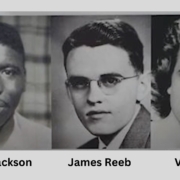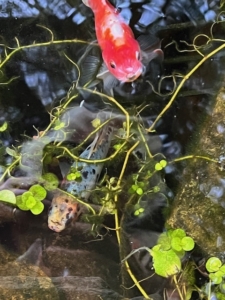Today we’re traveling to meet T.K. Thorne!
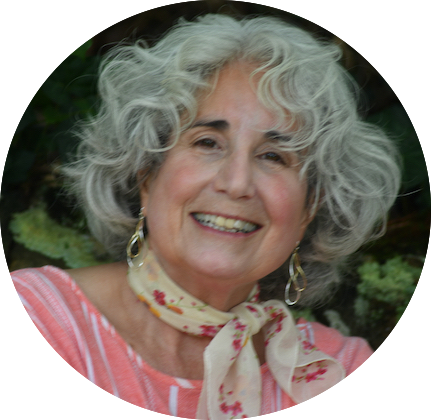
T.K. Thorne wanted to make first contact with aliens. When that didn’t work out, she became a police officer. Although most people she met were human, some were quite strange…. Retiring as a precinct captain, she writes full-time. Her books include two award-winning historical novels (Noah’s Wife and Angels at the Gate); two nonfiction civil rights era works (Last Chance for Justice and Behind the Magic Curtain: Secrets, Spies, and Unsung White Allies of Birmingham’s Civil Rights Days); and then she turned to crime with murder and magic in the Magic City Stories trilogy (House of Rose, House of Stone, and House of Iron). Read below to find out where her books have traveled.
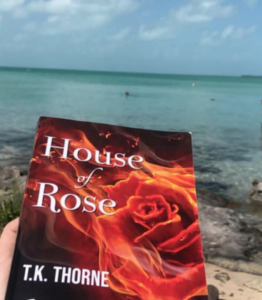
Belize or Bust!
A reader sent this picture from Belize! It was special to me because my husband had picked Belize as a place he wanted to go for our 20th anniversary. We stayed in a grass cottage in the heart of a tropical jungle. Howler monkeys woke us the first night at 3 a.m. We thought the world was ending! If you have never heard howler monkeys, horror movies used the sound for zombies!
One day, we climbed a steep Mayan temple for a breathtaking view over the jungle canopy. My husband had gotten a breathtaking view of my butt climbing ahead of him and thought it would be funny to take a picture. No, they never grow up, and no, I am not posting it!
The resort staff surprised us with a romantic anniversary dinner for us on board a pontoon boat and left us to float on the deserted lagoon by ourselves. Above, stars gleamed against a deep black sky like crystal dust. More than I have ever seen. I felt I could reach up and grab a handful. Then, our boat (which we had no way to steer) bumped into the shore and a mass of thick vegetation. Remembering the crocodiles we had seen on a previous night’s tour, we called for extraction.
How Deep Did You Say?
A few days later, we transferred to Ambergris Caye. At home, before the trip, my husband and I had gotten certified in scuba diving, planning to dive into the Belize Barrier Reef. It’s the largest reef in the Northern Hemisphere, but it’s accessible with only about a 40-50-foot dive. However, before our trip to the reef, an opportunity arose to dive the famous Blue Hole, which would mean going down 150 feet, way deeper than we’d ever been.
The Hole is over 400 feet deep and wide enough to be seen by satellite! I had cold feet, but by the following morning, I decided this was a once-in-a-lifetime opportunity, and I would regret it if we didn’t go. We had to scramble to get headlights (it’s dark that deep down!) and make the group cast off.
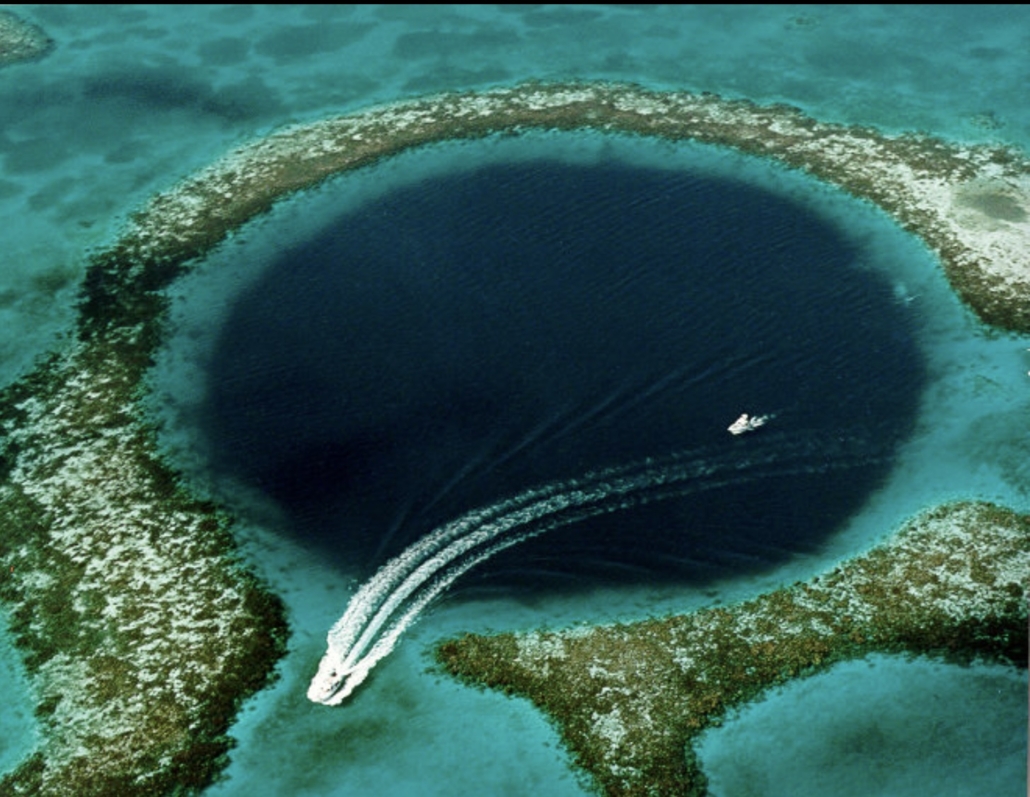
Screenshot
At the Hole, we donned our gear and started down. I could feel the pulse beating in my temples as we went deeper and deeper. Strangely, there was no sensation of increasing pressure, but we were accompanied by a circling escort of sharks I only later learned were harmless nurse sharks. However, I also later learned that hundreds of divers have died in the Blue Hole, something I guess the sharks were aware of. . . .
Stone Teeth
At about 150 feet, we encountered the top of the underwater caves and swam around a three-foot-wide stalactite that plunged below us like a gigantic stone tooth, disappearing into the darkness. Not only had we descended into the water’s depths, but we had traveled through time. During the last Ice Age (about 10 – 19,000 years ago), the sea was below the cave floor, meaning 400 feet below the current sea level!
Though there was a tense moment regarding air supply, we made it back to the surface without becoming shark food. The next dive was the Reef, which was, in a different way, as dramatic as the Blue Hole. To my left, every square foot was crammed with diverse, colorful coral and marine life. I was mesmerized and could have stayed in one spot the whole time! To my right, the deep, almost black blue vanished into infinity.
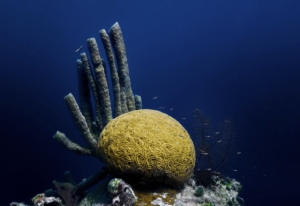
We had other adventures, but too much to tell. So, when a reader sent the picture of my book as her beach read in Belize, it was a treat to learn Rose (the heroine of House of Rose) had also traveled there. I doubt her trip was similar to mine, but Rose had stuff to deal with:
When rookie patrol officer Rose Brighton chases a suspect down an alley, she finds herself in the middle of every cop’s nightmare—staring down at a dead body with two bullet holes from her gun . . . in his back.
He’s dead and now she has to explain it, which is going to be a problem because what happened was so strange, she doesn’t understand it herself. Rose must unravel the mystery of what happened and who she really is—a witch of the House of Rose. If she doesn’t figure it out fast, there will be more bodies, including her own.
House of Rose, set in the Deep South city of Birmingham, Alabama, is the first book of the Magic City Stories.
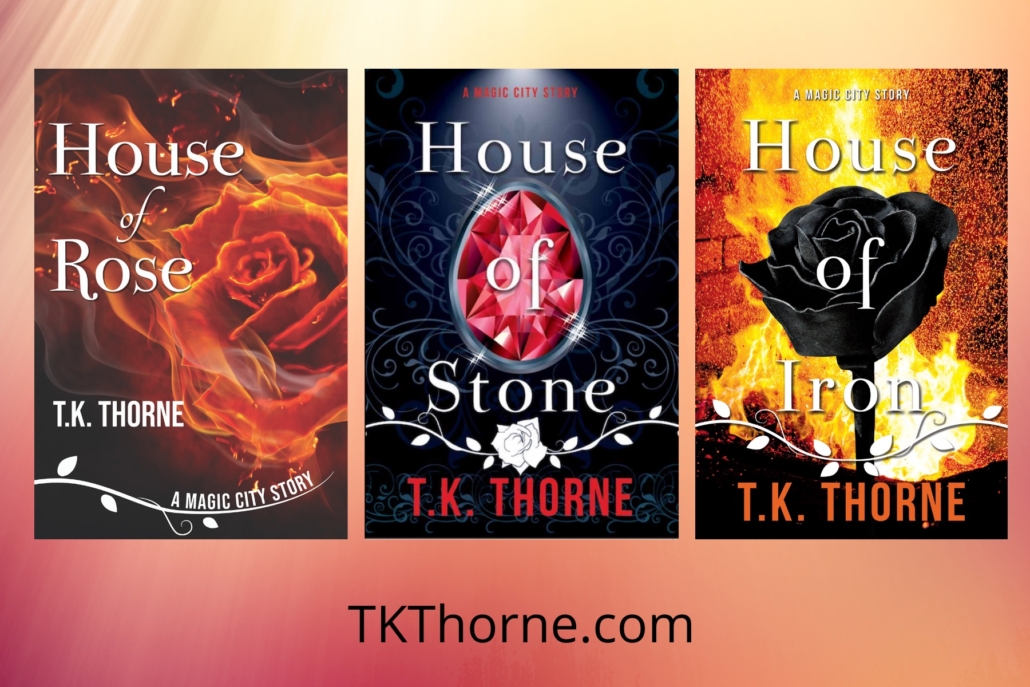
Also available as Audio Books on Amazon or Audible.com
What Folks Are Saying:
“Thorne delivers a spellbinding thriller, an enthralling blend of real-world policing and other-world magic.—Barbara Kyle, author of The Traitor’s Daughter
“A deftly crafted and riveting read.”—Midwest Reviews
“Thorne, a retired captain in the Birmingham PD, grounds the fantasy with authentic procedural details and loving descriptions of the city and its lore. Readers will look forward to Rose’s further adventures.”—Publishers Weekly
“T.K. Thorne is an authentic, new voice in the world of fantasy and mystery. An explosive story that will keep you on the edge of your seat. Pick up this story—you’ll thank yourself over and over again.” —Carolyn Haines, USA Today bestselling author of the Sarah Booth Delaney, Pluto’s Snitch, and Trouble the black cat detective mystery series
“Although House of Rose is speculative fiction, a kind of fantasy, T.K. Thorne is so knowledgeable about Birmingham and law enforcement that it is also, truly, a police procedural and a thriller—something for everyone. “House of Rose” is the first of a series which should be a hit.”—Don Nobles, reviewer for Alabama Public Radio

